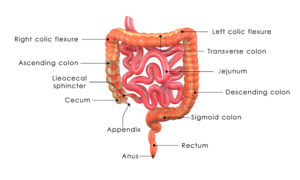What’s the best way to handle colorectal cancer?
The Surgical Clinic surgeons want everyone to know that early detection and treatment is the best way to approach Colorectal Cancer. Colorectal Cancer is the third most common cancer diagnosis in men and women in the U.S. It is the second most common cause of cancer deaths. The lifetime risk of developing colorectal cancer is about 5% (1 in 20). Men and African-Americans are more commonly affected. The good news is colorectal cancer is very treatable, if caught early. It is estimated that over 60% of colorectal cancer deaths are preventable if appropriate screening is done. This is due to the very high survival of patients with early stage colon cancer. Screening for colorectal cancer helps detect the disease at an early stage and there is a very high survival rate of patients with early stage colorectal cancer.
Multiple societies, including the American Cancer Society, the United States Preventive Services Task Force, the National Comprehensive Cancer Network and several professional medical societies have published joint screening recommendations for colorectal cancer. For the average person, screening should begin at the age of 50. If you have a family history of colorectal cancer, a personal history of polyps, inflammatory bowel disease, or certain genetic conditions, you may need to begin screening sooner.
What are the options to treat colorectal cancer?
There are multiple screening options that exist. Colorectal cancer screening tests are divided into two categories: those that can detect polyps and cancer and those that can detect cancer only.
Colonoscopy To Detect Colorectal Cancer
Colonoscopy is likely the most familiar test to screen for colorectal cancer. A colonoscopy is a medical procedure that allows a doctor to examine the inside of the large intestine (colon). This is a procedure that requires a bowel cleansing preparation, and then a camera on a flexible scope is used to evaluate the entirety of the colon and rectum. Some people do not want to undergo such an invasive test or have to endure a bowel preparation.
During a colonoscopy, a doctor inserts a long, flexible tube into the rectum and then slowly moves it through the entire length of the colon. This allows the doctor to get a close look at the lining of the colon and look for any abnormal growths, such as polyps or cancerous tumors. In most cases, a colonoscopy is performed on an outpatient basis, which means that patients can go home the same day as their procedure. Recovery from a colonoscopy is typically quick and relatively painless. However, some patients may experience cramping or bloating after the procedure due to air that was introduced into the intestine during the exam. Overall, a colonoscopy is a safe and effective way to screen for colorectal cancer.
Stool Screening
Other less invasive screenings include home tests which test the stool for either the presence of blood or other material that has been shown to be equally effective at detecting cancer.
A stool screening, also called a fecal occult blood test (FOBT), is a test that checks for hidden blood in the stool. It is used to screen for colorectal cancer, which is cancer of the colon or rectum. The colon and rectum are part of the large intestine, which is the lower part of the digestive system.
Screening for colorectal cancer with a stool screening can find cancers at an early stage when they are most likely to be curable. Finding and removing precancerous polyps can also prevent colorectal cancer from developing.
The test is usually done with a kit that you can use at home. The kit contains everything you need to collect a small sample of stool. You will then send the sample to a laboratory, where it will be checked for blood. If blood is found, follow-up tests will be needed to determine if there is cancer. These tests may include a colonoscopy, which is an examination of the inside of the colon using a flexible, lighted tube.
Talking with your doctor about which screening test best suits you is important. Remember, early detection of colorectal cancer is lifesaving. The best test is the one that gets done!
 What Happens If You Get a Colorectal Cancer Diagnosis
What Happens If You Get a Colorectal Cancer Diagnosis
A colorectal cancer diagnosis can be scary, but it is important to remember that there are treatment options available. If you are diagnosed with colorectal cancer, it is very likely you will need surgery. The first step is to meet with a doctor or cancer specialist to discuss your treatment options. Surgery is the cornerstone of colorectal cancer treatment. Early-stage colorectal cancer is potentially curable with surgery. The surgeons at The Surgical Clinic offer advanced surgical procedures in colorectal cancer surgery with minimally invasive and robotic surgery options. These have been shown to be as effective as traditional surgery for treating colorectal cancer with the benefit of less pain, faster recovery, and fewer complications associated with surgery. Chemotherapy and radiation therapy may also be recommended in some cases.
March is colorectal cancer awareness month. If you, your family, or your patients meet the criteria, encourage them to go get screened! The American Cancer Society recommends that people at average risk for colorectal cancer begin screenings at age 45. If you have a family history of colorectal cancer or other risk factors, you may need to start screenings earlier.

